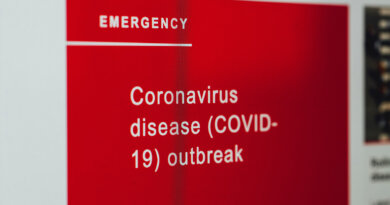Benefits, Side Effects, How To Use & More
To keep the lights on, we receive affiliate commissions via some of our links. Our review process.
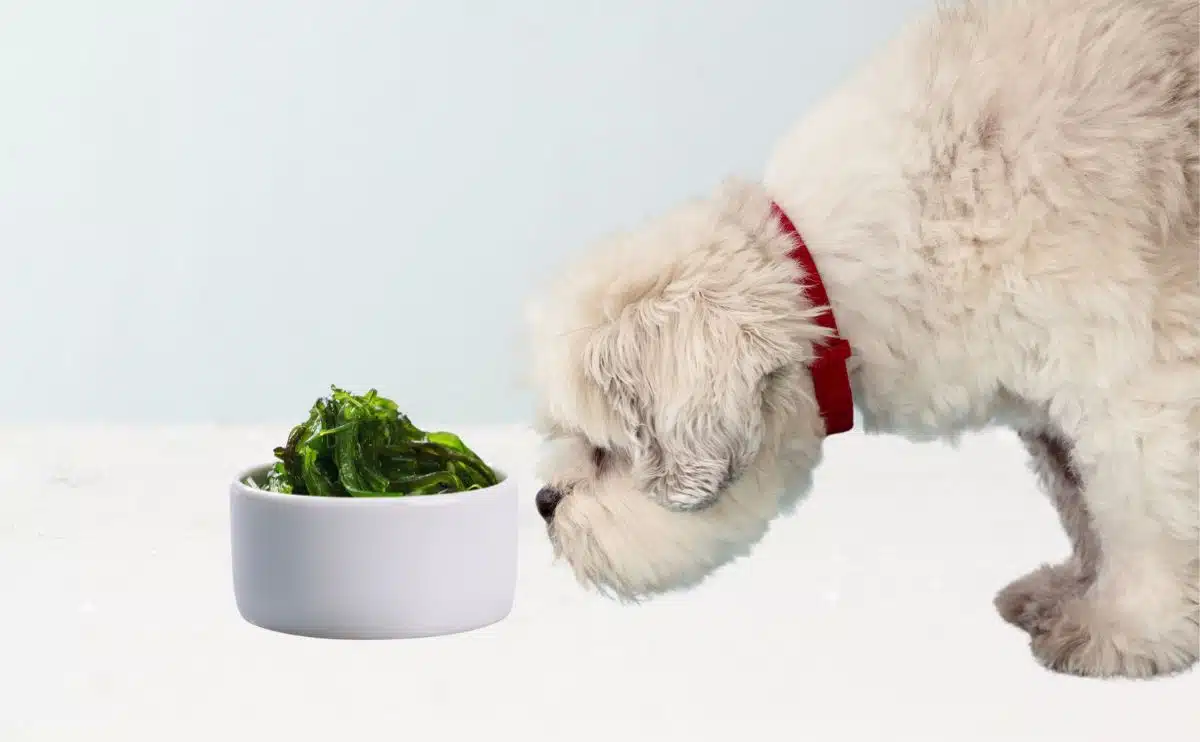
Dedicated dog owners like us work to provide their pups with the best nutrition. This includes being aware of the ingredients in a pup’s food. You may have noticed kelp as an ingredient in some pet food and supplement brands. What is it, and is kept safe for canines? Learn about the benefits for our canine companions and all about this superfood from the sea when it comes to our four-legged friends.
What Is Kelp?
Kelp (Phaeophyta) is an incredibly large brown alga that grows in shallow cool seawater. It grows in dense clusters and resembles an underwater forest. It can grow extremely large. Some varieties literally grow over a foot a day. There are around 30 known species.
Though this aquatic organism is sometimes referred to as a plant, looks like a leafy forest, and even has a root and stem-like structure, it is not a plant. Rather, it is a protest. While this is seaweed, not all seaweed is kelp. There are over 10,000 species of seaweed. Phaeophyta is always very large, whereas some other seaweeds are much smaller.
Sea vegetables have become a component of many different products we use daily, including shampoo, salad dressing, toothpaste, medications, dairy products, frozen foods, and sweets like cakes and puddings, among others. It is often added to soap due to its exfoliating components. Along with these uses, algae is sometimes included in dog foods as both a binding agent and to add minor nutritional value.
In dog food, this sea vegetable serves two main roles. It works as a thickener and binding agent and adds beneficial vitamins and nutrients to food. Brown algae are 25 % protein, so they may be used to boost the overall protein content of food. Additionally, Phaeophyta is high in fiber, making it easy to digest and beneficial to the digestive process. Sea vegetables are also believed to benefit dental health by reducing plaque and tartar. It can also help with skin allergies by reducing itching and inflammation.
Is Kelp Good For Dogs?
Yes, when used as a supplement in the right circumstances and appropriately in pet foods, it has many beneficial properties for pets. It aids in healing and overall health support. This superfood has been included in the human diet as a food and nutritional supplement for thousands of years. We still have much more to learn about it, and more research is being done into how this sea vegetable can benefit canine health.
Metabolism & Thyroid Function
Brown algae have prominent levels of iodine. Iodine plays a significant role in thyroid function and metabolism regulation. Iodine helps boost thyroid function and can impact metabolism and weight loss. It can also assist in regulating the adrenal, thyroid, and pituitary glands.
Nutritional Value
Kelp contains 21 amino acids and 60 different vitamins and minerals. It is also about 25% protein, contains high fiber and antioxidants, and acts as a prebiotic to promote digestion. It also helps to control negative gut bacteria. This sea veggie is low in both calories and fat and high in protein. It supports muscle development, healthy bones, a strong immune system, and metabolism regulation. The fiber content aids in digestion and healthy bowel movements. Some other valuable elements include Vitamin A, Vitamin K1, calcium, folate, iron, magnesium, and pantothenic acid.
Dental Health
It can boost dental health by reducing tartar buildup and plaque. It contains something called alginic acid, which helps to weaken the hold between plaque and teeth. Supplements may be beneficial in helping keep your puppy’s mouth clean and prevent bad breath.
Anti-itching & Anti-Inflammatory,
The iodine content in brown algae helps reduce inflammation and swelling, which can help with dental health, skin itching, and allergies.
Cancer Prevention
Brown sea vegetables contain elements with anti-tumor properties and others that can help slow the spread of cancer cells.
Stress Reducing
Brown algae are thought to have some stress-reducing and relieving qualities. It contains trace minerals that regulate blood sugar and boost metabolism, which helps combat the harmful effects of stress.
Dangers Of Kelp For Dogs
Though generally considered safe, this does not mean owners should start adding algae products to every meal. While it can be a powerful addition to a dog’s diet, some precautions should be taken when giving sea vegetables to pets. Always use the proper dosage when giving seaweed to pets. Too much can lead to iodine toxicity, which can cause vomiting, diarrhea, and other health problems.
In some cases, Phaeophyta can be dangerous if canines eat too much. Excessive amounts of iodine can lead to stomach discomfort, vomiting, and large weight loss.
Canines that suffer from hypothyroidism have low levels of thyroid hormone. Discussing your dog’s needs with your veterinarian before adding anything to boost thyroid function is important. Make sure to discuss seaweed with your veterinarian before feeding it to any dog with hypothyroidism.
Symptoms & Effects Of Kelp To Look Out For In Dogs
- Canines that overeat iodine in their diets increase their risk of developing hyperthyroidism, which means the thyroid will produce too much hormone. For this reason, it’s especially important that you discuss adding any kind of seaweed supplement to your pet’s diet beforehand with your veterinarian.
- Canines with kidney and liver disease should be cautious with seaweed as it contains elevated potassium levels.
- There are a lot of false claims surrounding pet supplements in the commercial market. Owners mustn’t believe too good to-be-true claims of supplements curing conditions, causing a rapid improvement, weight loss, preventing fleas, or other untrue or wildly exaggerated expectations.
- Though algae are high in fiber which can aid digestion, too much will overwhelm the digestive system and cause discomfort and diarrhea.
- Sea vegetables absorb harmful heavy metals from the water, so owners must research where a product’s primary ingredients are sourced.
- Some canines are allergic to seaweed. They will develop uncomfortable symptoms, including itchy skin, rashes, hives, diarrhea, etc. Pay attention to how your dog reacts after having the supplement for the first time and after that to ensure they do not have an allergic reaction.
Finally, knowing the potential dangers of contamination and pollution is essential. Seaweed can absorb pollutants from the water, which can harm pets who ingest it. Owners should aim only to use algae from trusted and clean sources. Avoid sea vegetables from areas that may be contaminated.
Ways To Give Your Dog Kelp
There are several ways this sea veggie can benefit canine health. One of the easiest and most affordable ways to incorporate algae into a canine’s diet is to add powder or dried algae to their food. Owners can mix this with their regular food or sprinkle it on top. Another way to use these with dogs is to make homemade doggy treats using dried seaweed. This is a fun and easy way to give your dog a healthy treat.
Dried brown algae is a more concentrated form that is sometimes an ingredient in homemade dog treats or added to your dog’s food. Liquid supplements are convenient for pet owners who want to add seaweed to their dog’s diet without the hassle of measuring out powder or dried sea veggies.
Seaweed can also act as a natural shampoo for pets. This shampoo can help promote healthy skin and coat and reduce itching and inflammation. To use the shampoo, simply wet your pet’s coat and apply it, working it into a lather. Rinse thoroughly and repeat as needed.
Best Kelp Supplement For Dogs
The best supplement depends on a pet’s individual needs, and there are a few options to choose from. Always discuss adding seaweed supplements to your pup’s diet with your veterinarian before rather than after making the change.
There are several seaweed products available for dogs. It is vital that owners stick to those intended for canines and never substitute a human supplement, powder, or product for their pet. Look for products that use a single, named source of algae from clean waters. Try to find products that are 100% USDA-certified organic. Avoid those from heavily polluted waters like the Southern and Northern Pacific Oceans, the North and South Atlantic, and the Indian Ocean.
Look for supplements with algae harvested from places like Canada, Norway, and Iceland, where ocean water is cleaner and less polluted. This is important as Phaeophyta directly absorbs contaminants and pollutants like metals and chemicals from the water in high concentrations.
Kelp Powder For Dogs
Powder is a versatile way to add this superfood to a pet’s diet. It comes in either a loose powder or gel cap form. Easy to sprinkle on food or water.
Nature’s Farmacy Dogzymes Norwegian Organic Kelp
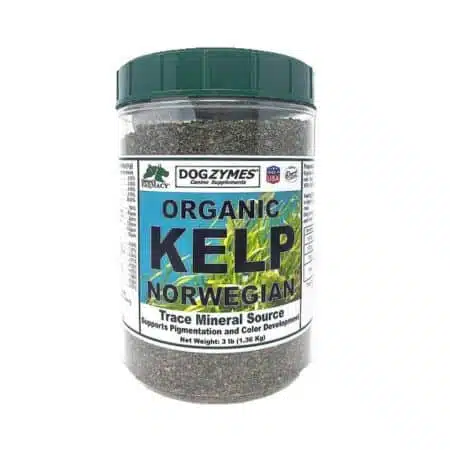
This single-source product is 100% USDA-certified organic Icelandic. Please consult your vet before use, especially if your dog suffers from hyperthyroidism. Best used with adult and senior dogs. Offers 8% crude protein, 2% crude fat, and 4% crude fiber.
Raw Paws Organic Kelp Supplement
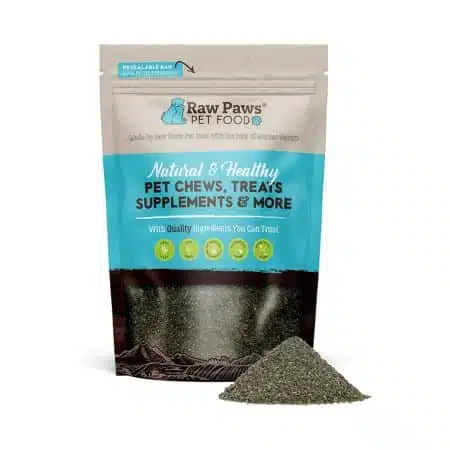
100% USDA-certified organic and sourced from fresh Icelandic waters. Single-sourced Norwegian kelp meal. Offers 6% crude protein, 1% crude fat, and 8% crude fiber.
Life Line Pet Nutrition Organic Ocean Kelp
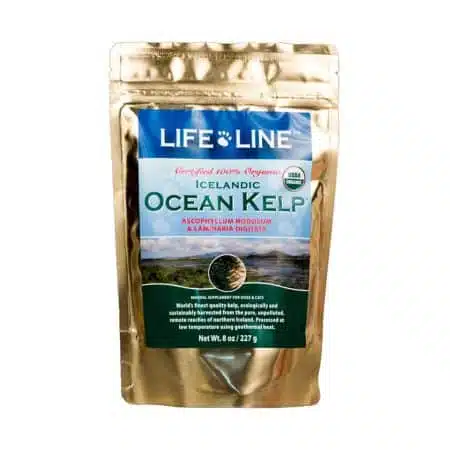
100% Certified Organic by WSDA to USDA National Organic Program standards. Grown in Iceland and dried at a constant low temperature by hot geothermal water. Packed in the US. Offers 6% crude protein, 1.5% crude fat, and 8% crude fiber.
Other Algae Supplements
Supplements also come in tablet form, dried seaweed, and liquid. Dried seaweed is sometimes used to make homemade dog treats or added to food. Liquid supplements can also mix in with water or food.
How Much Kelp To Add To Dog Food
Always read the directions on any supplement products before feeding them to your pet. Generally, dogs less than 30 pounds should not have more than ½ a teaspoon a day, and larger dogs can have up to two teaspoons. Many owners like to mash the powder in fruit like bananas, mix it in peanut butter, bake it in treats, or mix it in dry and wet food.
Sea Kelp For Dog’s Teeth
Is algae good for canine teeth? The answer is a big yes. It contains a bacteria called Bacillus licheniformis, which aids in breaking down tartar buildup. The bacteria feed on the tarter, helping to keep clean teeth and breath fresh. This is the best kind of seaweed for canine dental health. Always look for Ascophyllum nodosum, as this kind of algae improves tartar, plaque, and bad breath.
Spirulina vs. Kelp
Spirulina is an ingredient that many folks think is algae, a big misconception. This is a bacterium that contains a chemical allowing it to perform photosynthesis. Kelp is a form of brown algae, not a bacterium. Both are high in protein but can be dangerous if given in excess. Both must be from clean waters, or they might pose a health risk.
Frequently Asked Questions
Here are some of the questions (and answers) our readers ask most often about kelp and canines.
Is Spirulina Good For Dogs?
Spirulina is good for canines in the right amounts. It has some health benefits as long as it is from a clean source. These include cleansing toxins, improving gut health and digestion, supporting coat and skin health, and helping reduce allergies.
Can Puppies Have Sea Kelp?
Puppies can have sea vegetables, but not when they are very young. Wait until they are about six months old. Always discuss adding sea vegetables to your puppy’s diet with your vet beforehand.
What Are The Side Effects Of Kelp For Dogs?
While seaweed and algae are beneficial, too much can pose a problem. Dogs allergic to seaweed can experience some uncomfortable symptoms. Too much can lead to hyperthyroidism and hypothyroidism complications. Additionally, excess amounts of seaweed can cause lethargy, stomach upset, watery eyes, and runny nose.
Kelp & A Healthy Diet
Before adding supplements, owners must ensure their four-legged family members eat top-quality nutrition. A high-quality diet full of healthy, whole animal proteins, vegetables, fruits, and nutrients is essential. Stay away from foods with lots of fillers and hard-to-digest ingredients. If you want to support conditions like joint, bone, and muscle health, look for those that include glucosamine and chondroitin. Some allergies benefit from supplements as well. You can also investigate canine acupuncture and other treatments to ease pain and relieve inflammation.
Tagged With: Supplements




